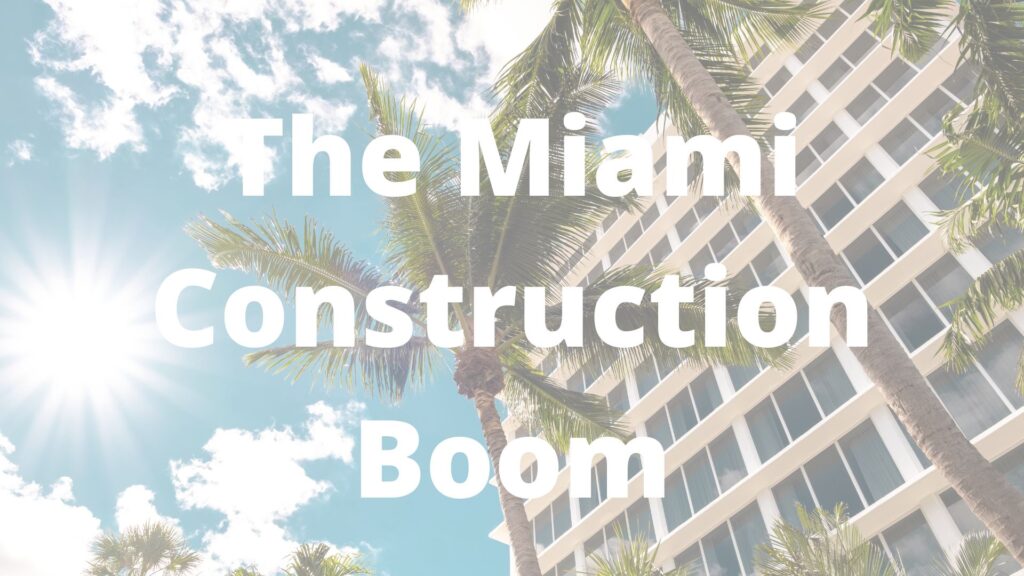
Miami’s iconic skyline is constantly evolving, punctuated by the rhythmic clang of hammers and the towering presence of cranes. The city is experiencing a significant construction boom, fueled by population growth, tourism, and a vibrant real estate market. From luxury condominiums reaching for the clouds to expansive infrastructure projects reshaping the urban landscape, Miami’s construction sector is a powerhouse of activity. However, this rapid growth comes with its own set of challenges and opportunities, particularly concerning worker safety in the intense Florida heat and the ongoing efforts to foster greater diversity within the industry.
The sheer scale of Miami’s construction boom is undeniable. New residential buildings are transforming neighborhoods, commercial developments are injecting economic vitality, and vital infrastructure upgrades are laying the groundwork for future progress. This surge in construction provides numerous job opportunities and contributes significantly to the local economy. Yet, the demanding nature of construction work in Miami’s subtropical climate necessitates a strong focus on worker well-being.
One critical aspect of worker safety in Miami is the management of heat exposure. The Occupational Safety and Health Administration (OSHA) has specific guidelines and recommendations to protect workers from heat-related illnesses. While there isn’t a specific federal heat standard for all industries, OSHA emphasizes the “General Duty Clause,” which requires employers to provide a workplace free from recognized hazards, including heat. In Miami, where temperatures and humidity can soar, adherence to these guidelines is paramount. Employers are expected to implement measures such as providing access to cool water and shade, scheduling frequent rest breaks in cool areas, gradually acclimating workers to the heat, and training employees to recognize the signs and symptoms of heat stress. These precautions are not just best practices; they are crucial for preventing serious and potentially fatal heat-related illnesses among construction workers.
Beyond safety, another significant area of focus in Miami’s construction industry is the increasing push for greater diversity and inclusion, particularly concerning the representation of women. Traditionally a male-dominated field, the construction industry is slowly but surely recognizing the valuable contributions that women can bring to all aspects of the work, from skilled trades to project management. Organizations and initiatives are working to encourage more women to enter the construction trades through mentorship programs, training opportunities, and by fostering a more inclusive and supportive work environment. While progress is being made, there is still ample room for growth in ensuring that women have equal opportunities and representation on Miami’s construction sites. Their involvement not only diversifies the workforce but also brings different perspectives and skills that can enhance productivity and innovation within the industry.
Miami’s construction boom is a powerful engine of growth and transformation for the city. As the skyline continues to evolve, it is essential that the industry prioritizes the safety and well-being of its workforce, particularly in the face of challenging environmental conditions like intense heat. Furthermore, the ongoing efforts to promote diversity and inclusion, and to increase the participation of women in all roles, are vital for building a more resilient, equitable, and innovative construction sector. By addressing these challenges proactively, Miami can ensure that its construction boom not only reshapes its physical landscape but also fosters a safer, more inclusive, and ultimately more sustainable future for all who contribute to building it.
John Caravella Esq., is a construction attorney and formerly practicing project architect at The Law Office of John Caravella, P.C., representing architects, engineers, contractors, subcontractors, and owners in all phases of contract preparation, litigation, and arbitration across New York and Florida. He also serves as an arbitrator to the American Arbitration Association Construction Industry Panel. Mr. Caravella can be reached by email: [email protected] or (631) 608-1346.
The information provided on this website does not, and is not intended to, constitute legal advice; instead, all information, content, and materials available on this site are for general informational purposes only. Readers of this website should contact their attorney to obtain advice with respect to any particular legal matter. No reader, user, or browser of this site should act or refrain from acting on the basis of information on this site without first seeking legal advice from counsel in the relevant jurisdiction. Only your individual attorney can provide assurances that the information contained herein – and your interpretation of it – is applicable or appropriate to your particular situation. Use of, and access to, this website or any of the links or resources contained within the site do not create an attorney-client relationship between the reader, user, or browser and website authors, contributors, contributing law firms, or committee members and their respective employers.

